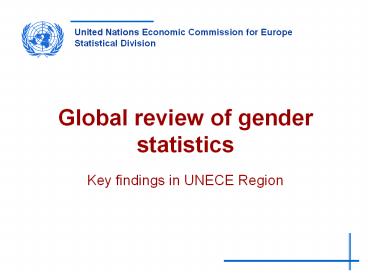Global review of gender statistics - PowerPoint PPT Presentation
Title:
Global review of gender statistics
Description:
Global review of gender statistics Key findings in UNECE Region – PowerPoint PPT presentation
Number of Views:64
Avg rating:3.0/5.0
Title: Global review of gender statistics
1
Global review of gender statistics
- Key findings in UNECE Region
2
Objectives of the survey
- Review gender statistics in national statistical
systems - Understand how gender statistics are mainstreamed
in NSO, in all areas of statistics - Identify good practices and challenges in
integrating gender into the production and use of
statistics
3
Survey characteristics
- 52 countries surveyed
- 24 replied (46)
- Expect more response for inclusion in the final
report
4
Respondents
- Montenegro
- Moldova
- Romania
- Serbia
- Slovakia
- Tajikistan
- Turkey
- United Kingdom
- Armenia
- Austria
- Azerbaijan
- Belgium
- Canada
- Croatia
- Denmark
- Finland
- Georgia
- Hungary
- Iceland
- Ireland
- Kazakhstan
- Kyrgyzstan
- Latvia
- Lithuania
5
1. Institutional arrangements
1.1 Organisational structures
6
1. Institutional arrangements
1.1 Organisational structures
7
1. Institutional arrangements
1.1 Organisational structures
8
1. Institutional arrangements
1.1 Organisational structures
9
1. Institutional arrangements
1.2. inter-ministerial mechanisms
() Official coordination bodies include national
statistical offices, independent working group
and inter-ministerial commission on equal
opportunities for men and women.
10
1. Institutional arrangements
1.2 inter-ministerial mechanisms
11
2. Production of gender statistics
12
3. Addressing users needs
- 16 countries mentioned having a dialogue
mechanism with users
13
4. Assessment of mainstreaming gender in National
Statistical System
These documents provide the overall objectives of
gender statistics mainstreaming in national
statistical systems.
14
4. Assessment of mainstreaming gender
Enhancing factors Political commitment
Strategic/Development plans Capacity
enhancement (infrastructure and
knowledge)Systematic gender approach in data
production (incl. Cooperation with other data
producers). Dialogues with stakeholders
15
4. Assessment of mainstreaming gender
- Challenges in achieving the objective
- Limited political support
- Difficulties in coordination with other data
producers - Insufficient integration of gender in Statistical
Programme - Unsuitability of administrative sources
- Limited financial and human resources, and
expertise
16
4. Assessment of mainstreaming gender
17
- Thank you!































